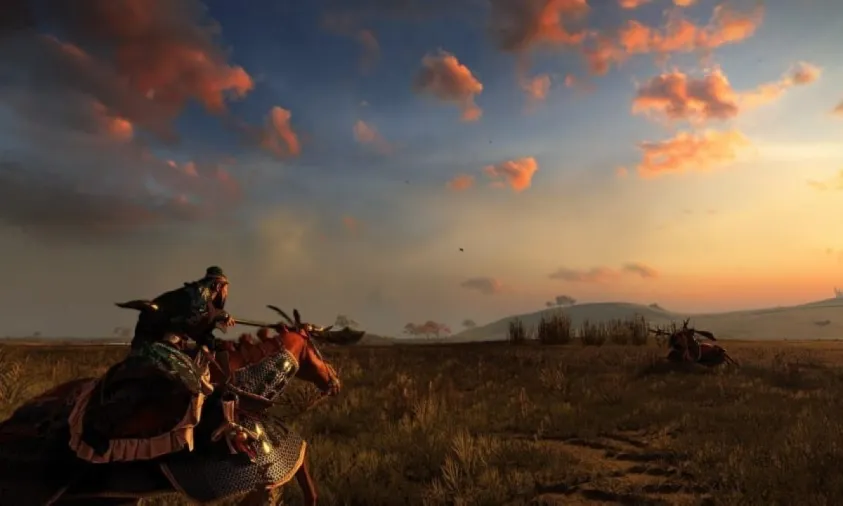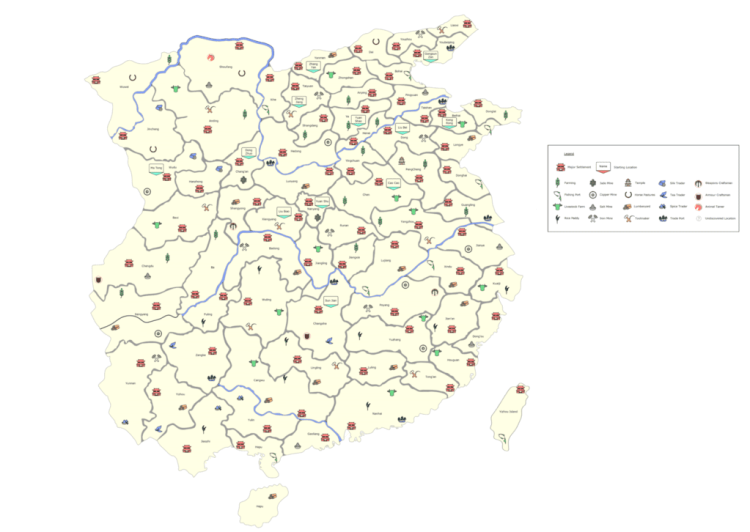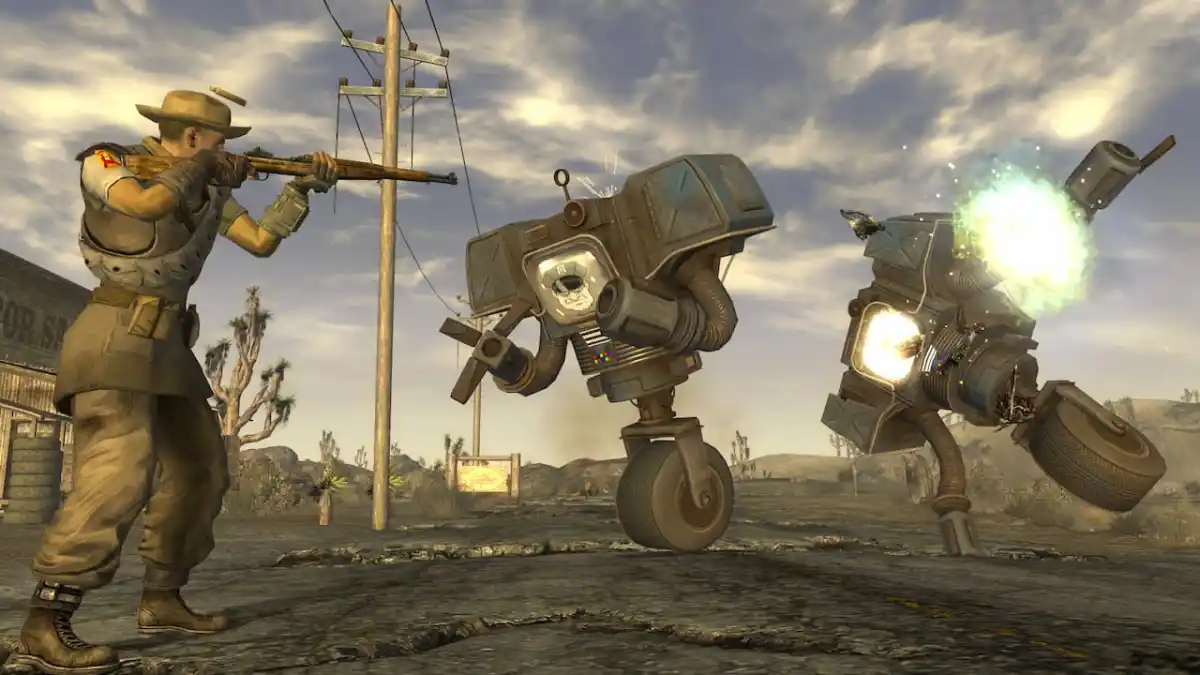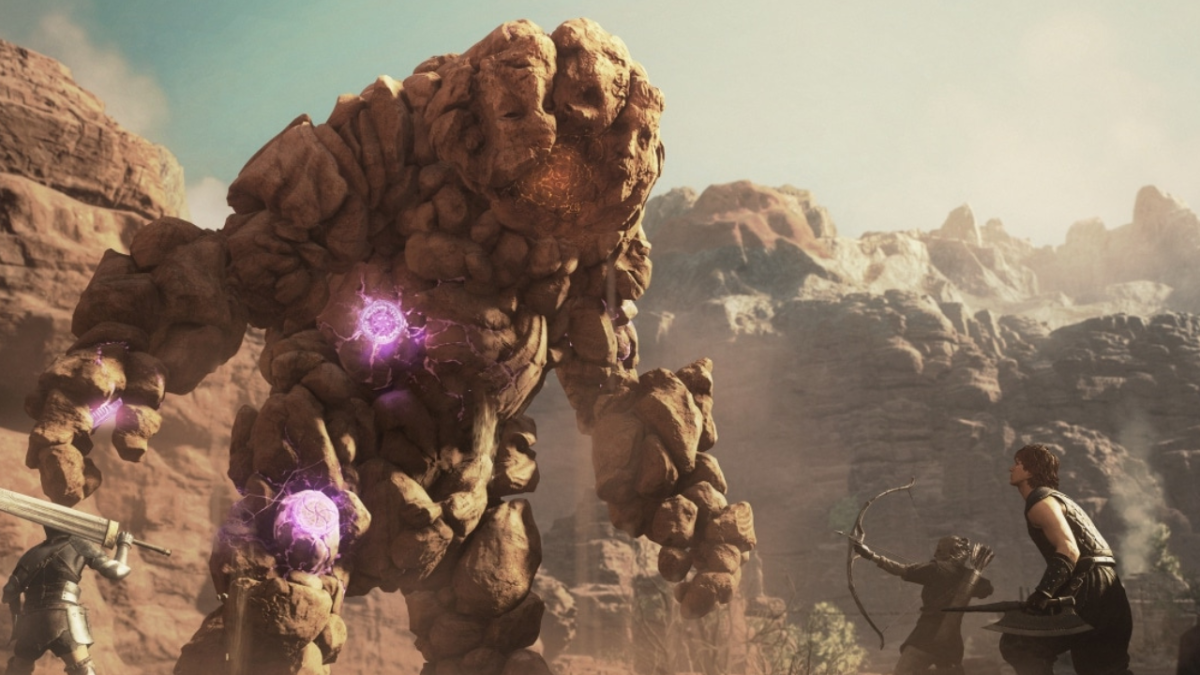Total War: Three Kingdoms is Creative Assembly’s latest historical strategy game. While you may be eager to conquer all of China, it’s not just all-out warfare that you need to focus on. You also need to be mindful of domestic policies, administration, officer relationships, diplomacy, espionage, and more. We’ll cover the more in-depth facets of these mechanics in this guide, especially ones which differentiate Three Kingdoms from previous Total War titles.
Do note that Total War: Three Kingdoms has two main modes. Romance Mode adds bombastic solo duels, leader skills, and heroes who can face off against entire armies. That’s actually the mode I preferred while completing the official review of the game.
Records Mode offers a more grounded experience where officers are surrounded by bodyguards, no skills are present, and battles are more realistic and tactical. You can check out Total War: Three Kingdoms’ Records Mode gameplay in the video below:
The Campaign Map
It’s all one big battle royale in China, and neither Fortnite nor PUBG are involved. There are over 75 commanderies (provinces) for you to control, each with their own cities and settlements. Terrain and geographical location play a major role in the landscape and background of the battles you fight as well. A battle for a trade port in the Yangtze River will look different compared to a battle in a port facing the open sea.
If you need to know what the entire map looks like, including the settlements and resources therein, just refer to the image below from Reddit user Skeewbs1. He’s been working on this project prior to the game’s release, taking down notes from various streamers and reviewers.
Faction Leaders
There are currently five different types of faction leaders in Total War: Three Kingdoms.
Coalition members such as Cao Cao and Liu Bei expand their territory to earn prestige. Capturing the city where the Han Emperor resides allows you to vassalize the Han Empire. Once any faction leader becomes king, they declare themselves emperors, along with the two other leaders that are the strongest. To win the campaign, you’ll need to take out the seats of your two rival emperors.
Governors such as Ma Teng and Liu Biao are loyal to the Han. The same progression for Coalition members still applies for their campaign, including capturing the Han Emperor. The difference is that even if governors do become kings, they do not declare themselves as emperors automatically. Their goal, therefore, is to take out all three pretenders to the throne. If you manage to capture a pretender’s capital, that’s when you’ll be able to declare yourself as their equal, establishing your own kingdom.
Outlaws such as Zheng Jiang and Zhang Yan have the same progression as Warlords. The difference is that they cannot vassalize the Han. Another key feature is that, at least with Zhang Yan, he can have diplomatic relations with the generic Yellow Turbans faction as well.
The Tyrant faction leader only has one example: Dong Zhuo. The power-hungry demagogue starts at war with almost every other faction. The good news is that you have the mighty Lu Bu at your side, and your faction rank is higher, allowing for more armies, administrators, and spies compared to your rivals at the start. You already have the Han Emperor under your control and the Han Empire itself as a vassal, allowing you to annex its territories by walking up to settlements and making a payment.
The Yellow Turbans are the last faction type. He Yi, Gong Du, and Huang Shao are rebels who are counted as a different subculture compared to the Han officers, and thus they can field different units. They also have a slightly different playstyle. They’ll be made playable as an early adopter bonus once the game launches on May 23.
Wu Xing
The Chinese philosophy of Wu Xing, which is about the world’s elements all coalescing and contributing as part of a cycle, is very much present in Total War: Three Kingdoms. The elements are earth (yellow), fire (red), wood (green), metal (grey), water (blue).
You’ll notice this color-coding system for your officers, showing how they represent a particular archetype and their stat allocation. You’ll also see this in unit types, where the color-coding or elements can complement or counteract another — ie. melee cavalry (earth/yellow) complement sword infantry (metal/grey) due to the inherent resistance to missiles from archers (water/blue). You might even see this philosophy in the five building types for settlements.
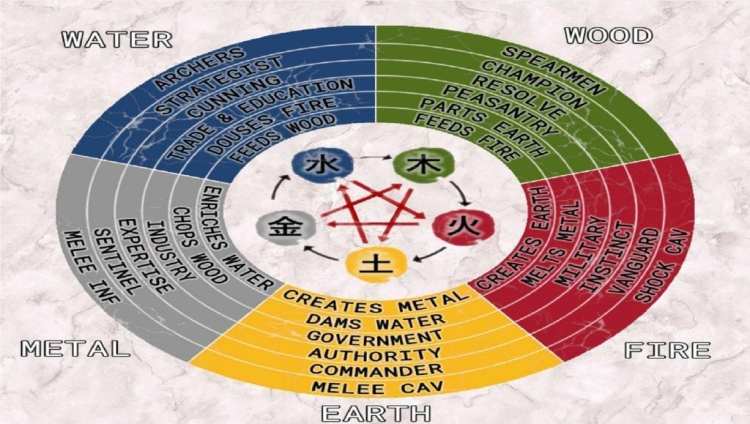
The Wu Xing philosophy and elements. Credit goes to the Total War fandom wiki.
Characters
Total War: Three Kingdoms has hundreds of characters in the game. Many of these, however, are your generic, non-historical additions. However, there’s still quite a number of actual historical officers who lived and ruled at the time. If you want to learn more about the themes and characters from this time period, take a look at Kongming.net and the Scholars of Shen Zhou forums.
Characters with a golden nameplate are considered legendary. They have slightly better stats, and they may even offer more perks when assigned to positions. The most important factor though would be resiliency. Legendary characters can suffer more “wounds” before they’re outright killed.
Note: Characters that die in Total War: Three Kingdoms are gone for good.
Characters also have a “satisfaction” mechanic. Basically, it’s their loyalty to you. Satisfaction may increase or decrease because of random events, length of time spent together in the same location or army, the need for higher positions in your government, or character traits.
Relationships with other characters will also play a role. For instance, if there’s a big red “X” mark for two people in the same city or army, it means they’re not getting along well. This can lead to tensions and dissatisfaction for both. Try to keep each character’s friends close, and their enemies closer as far away as possible.
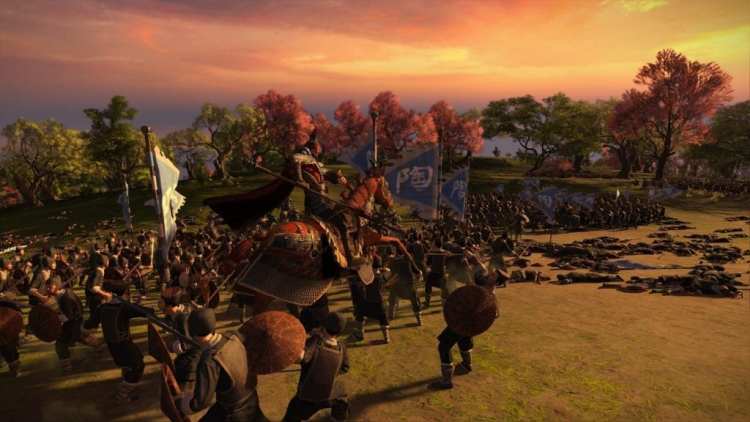
Lu Bu is obviously a legendary fighter. In this screenshot, he’s pouncing on hapless soldiers thinking he’s playing Dynasty Warriors.
Character Classes Or Archetypes
As mentioned, the philosophy of Wu Xing plays a major role, as the elements and color-coding are present:
- Commanders (earth/yellow) provide decent bonuses to melee cavalry, faction opinion, and peasant income via the focus on the Authority stat (character satisfaction and unit morale).
- Vanguards (fire/red) focus on shock cavalry, for the most part, speed, and blitzing through enemy lines. They also focus more on the Instinct stat (melee damage and recruitment cost discounts).
- Champions (wood/green) are your duelists who can be very tough to beat in straight up fights, with boosts to spearmen and food production. They focus on the Resolve stat (health increase and population growth).
- Sentinels (metal/grey) are front-liners who can take loads of damage while playing defensively. They focus on swordsmen and shielded infantry, industry boosts, and the Expertise stat (construction cost discounts and melee evasion).
- Strategists (water/blue) are tactical geniuses who handle commerce/trade assignments, with a knack for boosting archer units and siege weapons. Strategists should have a high Cunning stat (ammunition increase and military supplies).
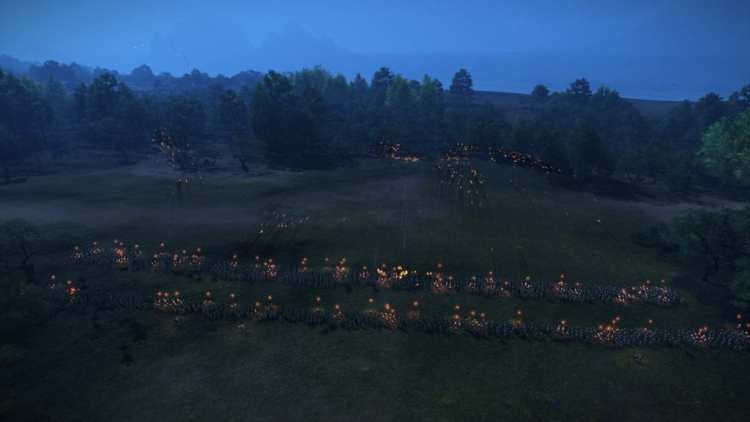
Strategists, Sentinels, and Commanders have access to fire arrows for archers. Only you can stop forest fires… but these guys ignored that bear.
Each character class in Romance Mode will have unique skills. For instance, Commanders can use a buff that blocks arrows, Vanguards have an AoE smite attack, and Strategists can improve (or debuff) ability cooldowns. These archetypes also have different capabilities when they’re given assignments or placed in a court position. Refer to this helpful chart from Total War Reddit user JNR13:
Retinues
Unlike previous Total War games, Total War: Three Kingdoms makes recruitment more personal via retinues. Each army can be comprised of three officers, and each officer can have up to six units as part of their personal retinue. These retinues cannot be handed off separately as units, you’ll need to transfer the actual officer along with their entire retinue. These units, though, can be swapped out for other types or disbanded. Retinues will be part of the officer’s card even if they ended up in another faction.
Ideally, to make the most out of an officer’s retinue, you’ll want to look at their respective class and possible talents. For instance, Strategists with high Cunning skill will have more ammunition and they also gain access to siege weapons. They even have talents to use fire arrows or flaming trebuchet shots. Putting a lot of missile units for a Vanguard or Champion type would be detrimental since they focus on shock cavalry and spear infantry respectively.
My ideal retinue composition would be:
- Commanders (with fire arrows skill) – 3x archers plus either 3x melee infantry or 3x melee cavalry
- Vanguards – 3x shock cavalry plus 3x spearmen; alternatively, just field 3x shock cavalry and 3x melee cavalry if your faction has a lot of discounts
- Champions (with spearmen armor skill) – 6x spearmen
- Sentinels (with fire arrows skill) – 3x archers plus 3x melee infantry; alternatively, have 4x infantry and 2x archers
- Strategists (with fire arrows and flaming shot skills) – 5x archers plus 1x trebuchet
One more thing, you might be wondering about “mustering” and “replenishment.” The two are complementary. Mustering is mostly tied to newly recruited units, determining how many turns you’ll need until all troops are good to go. Replenishment, meanwhile, determines how many troops you’ll “heal” for each turn (such as after incurring losses during a battle). However, replenishment still affects new recruits that are still mustering, and so higher replenishment will simply mean requiring fewer turns before your armies have all their troops back.
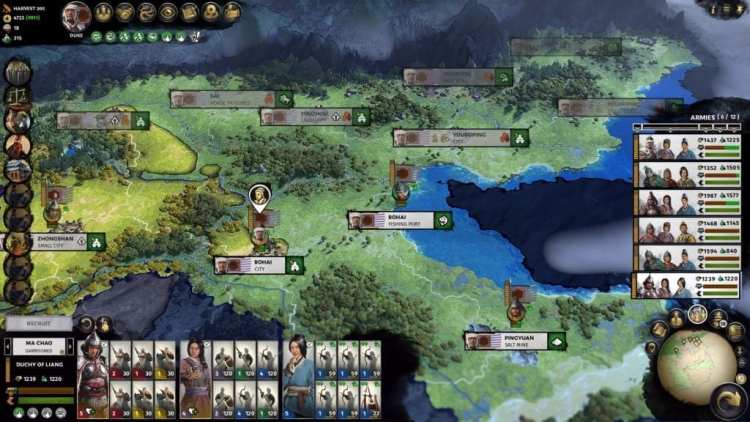
Recruit units based on your character’s talents and strengths. Merge generals and their retinues to have a balanced (and harmonious) army composition.
Ancillaries
In Total War: Three Kingdoms, the character bio panel is a lot cleaner and more intuitive than previous Total War games. You’ll clearly see your character’s rank/job title, their talents, and even the items they have equipped. You can choose to have weapons, armor, mounts, followers, and accessories.
The last two might require a tidbit of information. There are certain followers and accessories that increase officer satisfaction and stat lines, provide new unit formations or additional administrative options. More important though are followers that provide faction-wide perks such as industry income, officer satisfaction, corruption reduction, extra experience points, or public order. These are only available to the faction leader, faction heir, and prime minister.
Most ancillaries, barring a few historical items such as the Imperial Seal for Sun Jian, are randomized whenever you start you Total War: Three Kingdoms campaign. Feel free to restart if you ended up with terrible items.
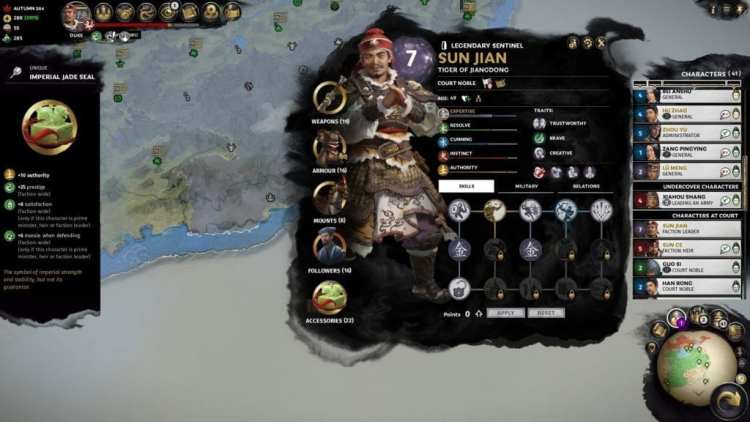
Look at Sun Jian’s smile. That’s the smile of someone who has the Imperial Seal which is an accessory in Total War: Three Kingdoms.
Officer Recruitment
There are multiple ways to obtain new officers:
- defeating an army in battle has a chance to let you capture an officer; some officers can be employed
- confederating or “diplo-annexing” (vassalize then annex) a faction will also lead to all officers joining you
- forcing a leader to abdicate to your rule (if you’re both leading kingdoms) will lead to the control of that entire faction as well
- a spy embedded in a faction may cause a civil war, and those loyal to your spy will join your faction
- the spy can also lower the satisfaction of officers in a rival faction, and they may leave that leader’s service
- arranged marriages
- roaming characters may also end up in your recruitment pool
- defeated factions may have their characters scattered across all of China, and you may even encounter legendary heroes or former faction leaders
- a handful of events may lead to historical heroes being recruited
Your Faction’s Court, Administrators, And Assignments
Your faction’s court shows all the available government positions, along with the recruitment pool of “free agent” characters. The faction leader, faction heir, and prime minister have bonus perks by way of ancillaries as mentioned above.
Administrators, meanwhile, can handle cities, providing a wealth of bonuses depending on the officer. Council positions will provide you with missions that add bonuses when you complete them (such as increased commerce income). Unlike administrator positions, council member perks are universal and not tied to a specific officer’s talents. Those assigned to any positions in the court can still go to battle or complete an assignment.
Assignments are short-term tasks for your officers. Based on their class and talents (and aforementioned archetypes) you can place them in cities to boost income for peasantry, industry, or commerce. They can also provide construction discounts, public order increase, or satisfaction boosts.
Note: Officers placed on assignment cannot be deployed as field commanders until their assignments are finished. Officers assigned to council or administrative positions, however, can still field armies. If an administrator is not actively on the campaign map leading troops, they’ll stay in their commanderies. If the province capital comes under siege, they’ll take to the field with their retinues along with that city’s garrison.
Managing Your Family And Dynasty
Building your dynasty is also necessary for Total War: Three Kingdoms. It’s even possible, through the machinations of the AI, a competing player, or your own faults, for your faction to devolve into civil war due to mismanagement. Let’s call it bickering or jealousy among family members and heirs.
You can adopt characters, or even marry them off to your officers, continuing your dynastic line. Characters tagged as “family members” or “distant relatives” can be used for diplomatic deals involving marriages. The “receive marriage” option will have the AI faction’s officer join you, while the “offer marriage” option will have your officer join the AI.
Likewise, you can order officers to divorce their spouses. Beware, though, because a relative by marriage (or distant relative) will lose that “tag” if you use the divorce option even if they’re part of that family to begin with. The game considers this as “divorcing them from the ruling family.” For instance, when playing as Liu Bei other characters such as Liu Dai and Liu Huimin are counted as distant relatives. Liu Huimin, who’s single, can be used in a diplomatic marriage to get an officer to join your faction. If you order Liu Huimin to divorce her new spouse, she loses the distant relative tag and she can no longer be used for future diplomatic marriages. Instead, you’ll want to find female officers to adopt into your family in the hopes of being able to obtain more officers by marriage.
Making babies can also take a while. It’s just plain luck — well, technically, that’s how we’re born as well, sheer luck. You don’t need to have the couple in the same army; baby-making just happens. Sometimes, you’ll have lots of kids within a few years. Sometimes, you’ll reach a hundred turns without having a child. Alternatively, just adopt a good officer to make them your heir or have guys like Lu Bu marry into the family. Getting tagged as an in-law/relative will make them eligible to be your heir as well.
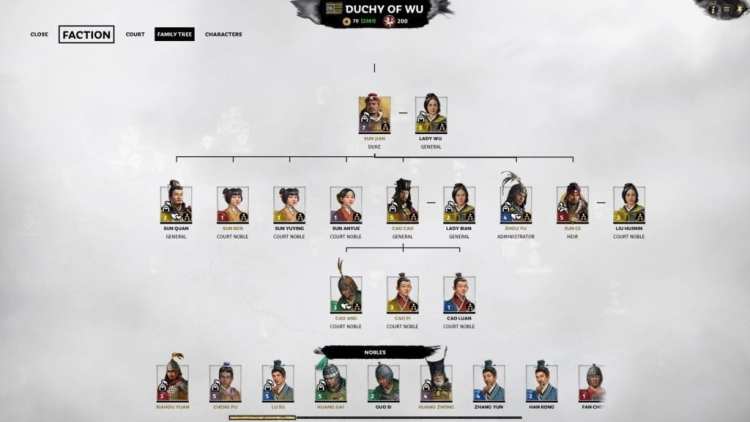
As Sun Jian, I vassalized, annexed, and adopted Cao Cao into my family. Cao Cao’s existing sons also became part of the next generation as well. Sun Jian’s now a grandfather.
Public Order And Corruption
There are multiple types of buildings you can construct in cities to increase public order. Of course, administrator effects, assignments, ancillaries, a garrisoned army, and lower taxes also help.
In case public order gets too low, you’re looking at a rebellion. Things work differently in Total War: Three Kingdoms. Rather than spawning a full stack of rebels for you to deal with, the game will spawn a lone Yellow Turban army that slowly musters. Once it’s gathered enough troops (maybe even an additional officer), it’ll besiege and capture your settlement.
The good thing is that you can just wait for public order to hit low levels, and a notification will tell you that a rebellion is imminent. That’s when you should recruit an army (preferably with five to six cheap units) just one turn before the rebellion happens. By the time the rebels spawn, your army would’ve slightly replenished its troops, enough to auto-resolve a decisive victory. Just disband your whack-a-mole army and wait for the next rebellion to pop up.
Alternatively, just park your units inside your city even though the rabble’s outside. While a rebellion is mustering, your province gets its public order increased each turn. Just strike out when you want to play with your new friends.
Do note that “Corruption” is an entirely different mechanic which rises as your city grows. Higher corruption means fewer taxes go to your coffers since people are pocketing them. Administrators, assignments, ancillaries, and tech reforms also help lower corruption. (No, don’t worry, corruption won’t make vampires or ratmen spawn.)
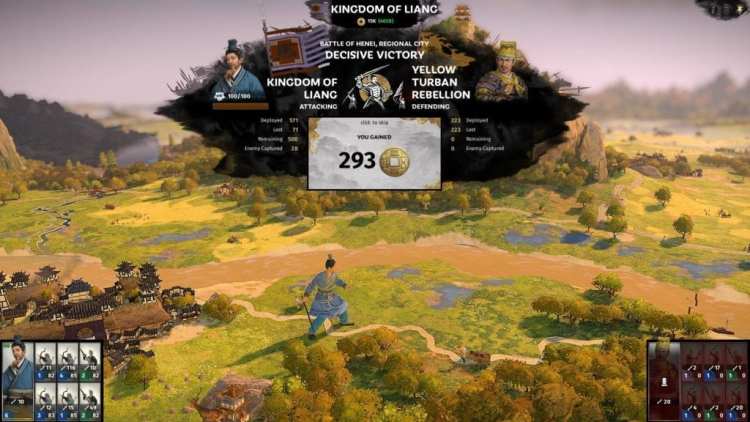
Wait one turn before a rebel army spawns. Recruit your own army, end your turn, then slap the rebels as Darth Vader did in Empire Strikes Back.
Diplomacy
Diplomacy has gotten a major overhaul in Total War: Three Kingdoms. It’s definitely a lot more in-depth now. The Quick Deals panel lets you see every type of diplomatic arrangement you can try, whereas the Negotiations panel offers more options.
You can trade for gold, food, ancillaries, arranged marriages, and the like. You may also vassalize, annex, confederate, or support someone’s independence or claim to emperorship. Players may also form coalitions with one another against a common foe, or upgrade that into a military alliance. The former still allows members to avoid participating in a war, whereas the latter will lock down a partner if you commit to an alliance war. Suing for peace can be done for separate coalition members, but, for alliance members, you’ll need to have a peace deal for the entirety of the alliance.
There’s also the possibility of issuing an ultimatum to force the AI faction to comply, although you suffer a slight diplomatic hit. Playable factions may have additional options such as manipulation/proxy wars (Cao Cao), unification (Liu Bei), or coercion (Dong Zhuo).
You can mix and match some of these diplomatic proposals to come up with some hilarious results. For instance, I once managed to nab Zhang Fei from his sworn brother, Liu Bei, due to shenanigans:
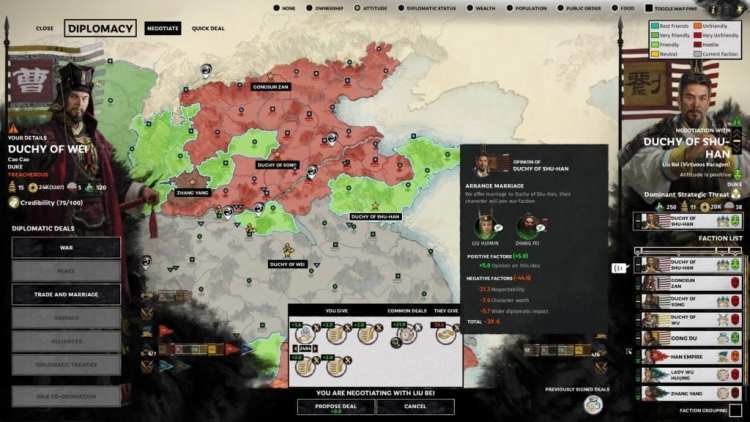
Zhang Fei was supposed to be Liu Bei’s sworn brother. They ended up listening to Father and Son by Cat Stevens. Zhang Fei found a girl and he settled down since he wanted to get married. Look at Cao Cao, he is old, but he’s happy (after recruiting the mighty warrior).
Espionage
One of the most anticipated features in Total War: Three Kingdoms is the new espionage system. Unlike previous Total War games where agents or heroes are completely separate from generals leading an army, Three Kingdoms can have anyone as an army leader, and also as a possible spy.
You can send your officers to spy on a faction and, after a few turns, that leader might recruit them (or they’d go back to base empty-handed). Once recruited, they’ll begin building their undercover network and cover. Spies can also end up getting captured, or they might decide to fully join their new master.
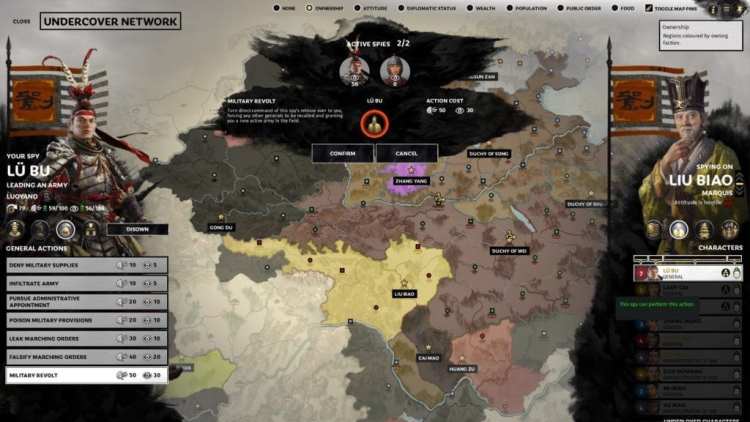
Lu Bu is probably the most conspicuous spy around. Then again if he gets caught, he can easily escape — because no one pursues Lu Bu.
There are four different roles that they can have:
- Court Noble – The spy is just part of the faction, lounging around. You can fiddle around with trade, lower officer satisfaction, boost your undercover network, or even steal an item.
- Administrator – The spy has been assigned as an administrator for a city. This allows them to poison the garrison, start an uprising, or welcome you as a liberating conqueror.
- General – The spy is leading forces in the field. They’ll be able to poison surrounding armies, slow down movement, stunt unit replenishment, or start a military revolt which detaches all other retinues, sending them back to base.
- Family – The spy has become a member of the dynasty. This has some nifty options including killing the faction leader, the heir, instigating a civil war, or surrendering the entire faction completely. This last one is possible if the spy manages to become the faction leader.
There seems to be a problem, though, as you can see below. My spy, Han Chong, ended up becoming the leader of Yuan Shao’s forces. Unfortunately, there’s no way for me to surrender the faction completely.
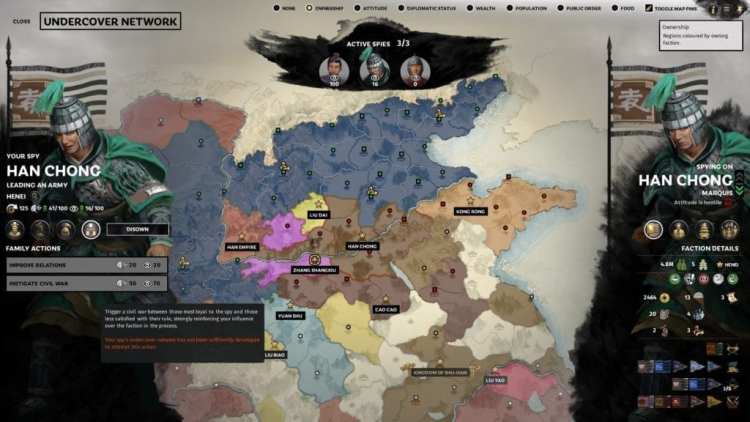
My spy, Han Chong, was leading Yuan Shao’s faction after killing the leader and his heir. There’s no option for me to surrender his forces though.
Tech Tree And Reforms
One of the coolest new features in Total War: Three Kingdoms is the tech tree. It just screams of unique aesthetics and themes, adding to the flavor of the time period and setting. Rather than picking an item to research for several turns, you only need to choose reforms every five turns. The results are instant. Some notable picks include trade agreements, additional administrator positions, and additional assignments.
There’s no general way of making tech tree selections for all the factions. You’ll want to look at the lay of the land to see where you’d want to focus on. Cao Cao may want farming techs (green line) since his start location has lots of farm settlements. Dong Zhuo, meanwhile, might focus on industry (grey) because of his location. Liu Bei can ignore additional administrator positions (yellow) since his gameplay mechanic, Unity, allows him to get those positions quickly anyway. Kong Rong would go for trade (blue) because he’s a moneymaker.
Historical And Custom Battles
Total War: Three Kingdoms allows up to six generals and their respective retinues to face off in custom battles. You can even add a CPU teammate with its own army. As for historical battles, you’ve got six to choose from:
- Battle of Xingyang (190 AD) – Cao Cao vs. Xu Rong
- Conquest of Jiangdong (196 AD) – Sun Ce vs. Wang Lang
- Siege of Xiapi (199 AD) – Cao Cao vs. Lu Bu
- Stand at Changban (208 AD) – Zhang Fei vs. Cao Cao
- Battle of Red Cliffs/Battle of Chi Bi (208 AD) – Sun Quan vs. Cao Cao
- Invasion of Jing Province (219 AD) – Guan Yu vs. Lu Meng
Take a look at our video below for the Stand at Changban where Zhang Fei and his spearmen try to hold off Cao Cao’s cavalry on Changban Bridge:
Unifying China
The land once united must divide; the land once divided must unite. Perhaps you’ll be the one who eventually unites all of China in Total War: Three Kingdoms.
We hope this guide helps you out in your conquests. Don’t forget to check out our other guides and features in this helpful Total War: Three Kingdoms hub right over here.

